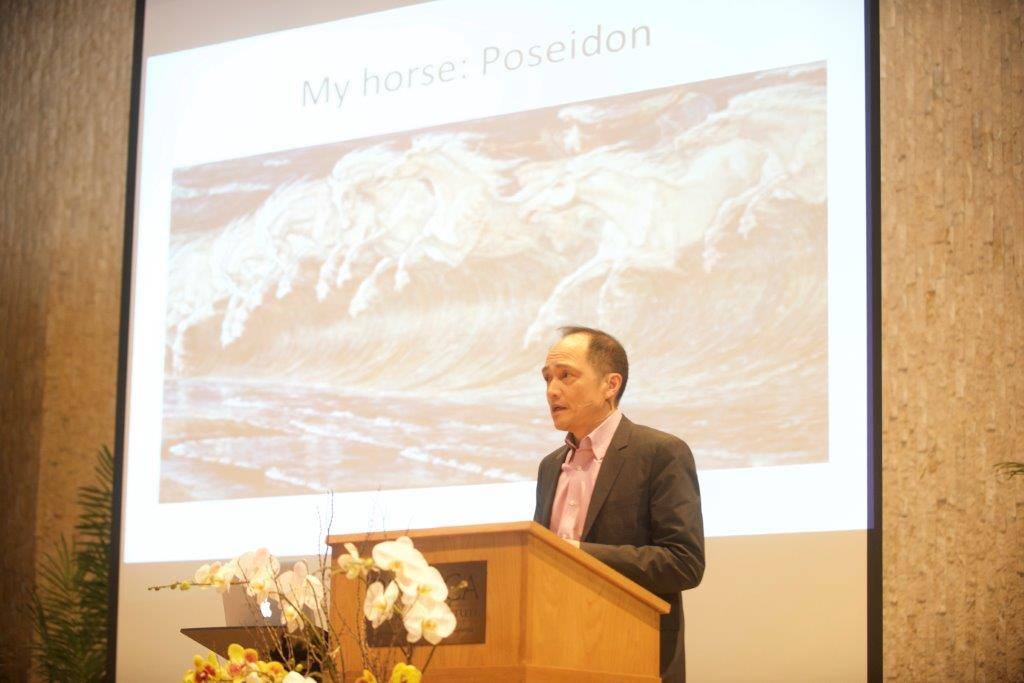河合教授が米国・Pacifica大学院でのシンポジウムとユング研究所での公開講座に登壇しました
 2016年4月23日、河合俊雄教授が米国・カリフォルニア州サンタバーバラ近郊のPacifica大学院の40周年記念シンポジウムで講演し、翌24日、ロサンゼルスのユング研究所での公開講座で講義をおこないました。
2016年4月23日、河合俊雄教授が米国・カリフォルニア州サンタバーバラ近郊のPacifica大学院の40周年記念シンポジウムで講演し、翌24日、ロサンゼルスのユング研究所での公開講座で講義をおこないました。
講演、講義は英語でおこなわれました。畑中千紘助教(上廣こころ学研究部門)によるまとめをご紹介します。
Pacifica大学院でのシンポジウムは”Climates of Change and the Therapy of Ideas”(気候変動と概念の心理療法)がテーマとなり、河合教授は東日本大震災と日本の自然観をテーマに、”A Traditional View of Nature and its Transformation: Lessons of the 2011 Earthquake in Japan”(伝統的な自然観とその変容:2011年東日本大震災の教え)というタイトルで講演しました。
この講演ではまず、狐や狸に化かされていたような前近代の日本の世界観が現代において自然の否定・内在化によって人間が自然をコントロールするような見方にとってかわったことが指摘されます。
自然の内在化とは、そもそも西洋文明に典型的なことですが、日本文化ではミニチュア化という独自の仕方で生じており、すべての自然が象徴的に表現された庭園や仏教の布教に使われた絵図、狸谷山不動院にみられる小さな巡礼の道などにも、その特徴をみることができます。
しかしながら、2011年の東日本大震災の衝撃は、我々の自然観を再び大きく変えることになります。震災後のこころのケアの活動の中で出会った子どもの作品にも自然の大いなる力に圧倒され、それを畏怖し賛美さえするような作品がみられたように、自然とは人の手の内に入ってしまうようなものではなかったということなのでしょう。
また単に自然の脅威に圧倒されただけではなくて、原発の問題に示されているように、われわれが自然を傷つけ、自然に対するイノセンスを失ったというのも大きな打撃です。では、自然に圧倒されただけではなくて、自然を傷つけてしまった我々はどのような新たな自然観を身につければよいのでしょうか。
村上春樹はエルサレムの講演で、彼の父親が戦争で亡くなったすべての人に祈り続けていたことを話しました。このような課題にとりくんでいくには、とてもとても長い時間がかかるのかもしれません。村上春樹が物語をかきつづけることで父の仕事を引き継いでいるようにこの大きな仕事には、世代を超えて取り組み続けることが大切なのかもしれません。
また、これに続き、ロサンゼルスのユング研究所において、”Haruki Murakami and the State of Psyche Today”(村上春樹とこころをめぐる昨今の状況)というタイトルにて、3時間にわたる講義をおこないました。
この講義では、ポストモダン的な世界を描いている村上春樹の小説を題材に、日本の中世の物語やユング心理学の考え方と比較しながら、現代における異界のあり方、他者との相互浸透とインターフェース物語のネットワークなどのテーマについて議論を展開しました。また、特に最近の村上春樹作品にみられる主体の立ち上がりと「自然(じねん)」、偶然の出会いのテーマは現代の心理療法におけるポイントにも共通していることが指摘されました。
[DATA]
Saturday, April 23, 9:00-10:45 AM / Pacifica Graduate Institute
A Traditional View of Nature and its Transformation: Lessons of the 2011 Earthquake in Japan
Toshio Kawai
http://www.pacifica.edu/pp-previous-public-programs-final/item/climates-of-change-and-the-therapy-of-ideas
Western civilization is characterized by the transformation of nature from being a dominating subject to an object of human study, which lead to the natural sciences. Recent awareness of environmental issues still remains within this framework and impact us globally, nationally, and within the therapy room. In sharp contrast, the pre-modern view of nature is the enduring perspective in Japan in which the transformation of nature has gone through a different process, leading to art and healing techniques. The Japan Earthquake of 2011 caused not only unprecedented human and material losses, but also demanded a reconsideration of our relationship with nature. This catastrophe shook our human centered view of nature and reminded us of the latent, but still exiting, pre-modern view of nature with “nothingness” as basis of being. At the same time it revealed the limitedness of the pre-modern worldview, especially concerning the Fukushima disaster and radiation leakage. Climate change has to do with this last point. In the face of these difficulties Dr. Kawai will show the importance of traditional views of nature in Japan and will suggest the necessity of overcoming or transcending both traditional and scientific view of the nature.
Sunday, April 24, 2016; 10:00AM – 01:00PM / C.G. Jung Institute of Los Angeles
Haruki Murakami and the State of Psyche Today
Presented by Toshio Kawai, Ph.D.
http://www.junginla.org/t/publicprograms/2016/winterspring/month/april/?submenu=0
Haruki Murakami is probably the most popular Japanese novelist whose works are translated into many languages. Deceptively easy to read, they can also be very enigmatic. Kawai, a visiting analyst from Japan, will use Murakami’s novels as a basis for reflecting on the current state of the psyche today, and the kinds of relationships he thinks are possible, both between people, and with the larger transcendent world of the unconscious.
この講演ではまず、狐や狸に化かされていたような前近代の日本の世界観が現代において自然の否定・内在化によって人間が自然をコントロールするような見方にとってかわったことが指摘されます。
自然の内在化とは、そもそも西洋文明に典型的なことですが、日本文化ではミニチュア化という独自の仕方で生じており、すべての自然が象徴的に表現された庭園や仏教の布教に使われた絵図、狸谷山不動院にみられる小さな巡礼の道などにも、その特徴をみることができます。
しかしながら、2011年の東日本大震災の衝撃は、我々の自然観を再び大きく変えることになります。震災後のこころのケアの活動の中で出会った子どもの作品にも自然の大いなる力に圧倒され、それを畏怖し賛美さえするような作品がみられたように、自然とは人の手の内に入ってしまうようなものではなかったということなのでしょう。
また単に自然の脅威に圧倒されただけではなくて、原発の問題に示されているように、われわれが自然を傷つけ、自然に対するイノセンスを失ったというのも大きな打撃です。では、自然に圧倒されただけではなくて、自然を傷つけてしまった我々はどのような新たな自然観を身につければよいのでしょうか。
村上春樹はエルサレムの講演で、彼の父親が戦争で亡くなったすべての人に祈り続けていたことを話しました。このような課題にとりくんでいくには、とてもとても長い時間がかかるのかもしれません。村上春樹が物語をかきつづけることで父の仕事を引き継いでいるようにこの大きな仕事には、世代を超えて取り組み続けることが大切なのかもしれません。
また、これに続き、ロサンゼルスのユング研究所において、”Haruki Murakami and the State of Psyche Today”(村上春樹とこころをめぐる昨今の状況)というタイトルにて、3時間にわたる講義をおこないました。
この講義では、ポストモダン的な世界を描いている村上春樹の小説を題材に、日本の中世の物語やユング心理学の考え方と比較しながら、現代における異界のあり方、他者との相互浸透とインターフェース物語のネットワークなどのテーマについて議論を展開しました。また、特に最近の村上春樹作品にみられる主体の立ち上がりと「自然(じねん)」、偶然の出会いのテーマは現代の心理療法におけるポイントにも共通していることが指摘されました。
[DATA]
Saturday, April 23, 9:00-10:45 AM / Pacifica Graduate Institute
A Traditional View of Nature and its Transformation: Lessons of the 2011 Earthquake in Japan
Toshio Kawai
http://www.pacifica.edu/pp-previous-public-programs-final/item/climates-of-change-and-the-therapy-of-ideas
Western civilization is characterized by the transformation of nature from being a dominating subject to an object of human study, which lead to the natural sciences. Recent awareness of environmental issues still remains within this framework and impact us globally, nationally, and within the therapy room. In sharp contrast, the pre-modern view of nature is the enduring perspective in Japan in which the transformation of nature has gone through a different process, leading to art and healing techniques. The Japan Earthquake of 2011 caused not only unprecedented human and material losses, but also demanded a reconsideration of our relationship with nature. This catastrophe shook our human centered view of nature and reminded us of the latent, but still exiting, pre-modern view of nature with “nothingness” as basis of being. At the same time it revealed the limitedness of the pre-modern worldview, especially concerning the Fukushima disaster and radiation leakage. Climate change has to do with this last point. In the face of these difficulties Dr. Kawai will show the importance of traditional views of nature in Japan and will suggest the necessity of overcoming or transcending both traditional and scientific view of the nature.
Sunday, April 24, 2016; 10:00AM – 01:00PM / C.G. Jung Institute of Los Angeles
Haruki Murakami and the State of Psyche Today
Presented by Toshio Kawai, Ph.D.
http://www.junginla.org/t/publicprograms/2016/winterspring/month/april/?submenu=0
Haruki Murakami is probably the most popular Japanese novelist whose works are translated into many languages. Deceptively easy to read, they can also be very enigmatic. Kawai, a visiting analyst from Japan, will use Murakami’s novels as a basis for reflecting on the current state of the psyche today, and the kinds of relationships he thinks are possible, both between people, and with the larger transcendent world of the unconscious.
2016/05/20